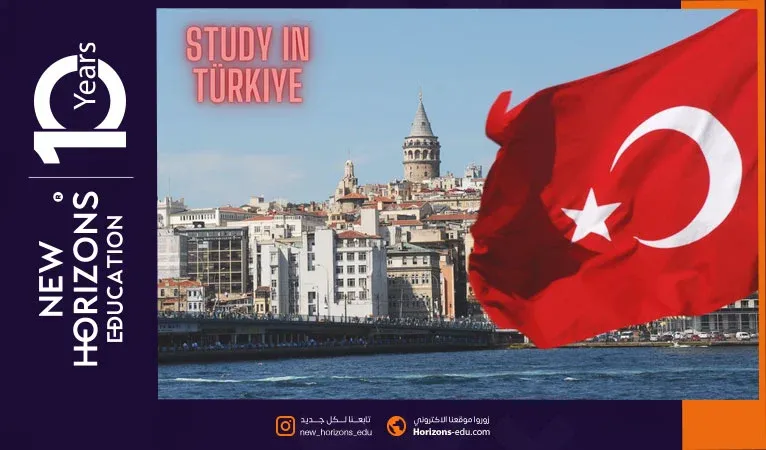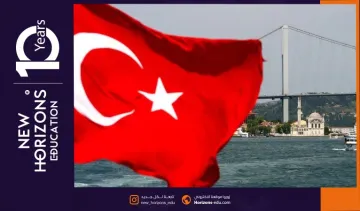
Turkey offers a unique educational experience that combines a rich history with modern development, as well as cultural and scientific diversity.
It is a destination for many students wishing to pursue their studies abroad, due to its diverse range of specializations across all fields, all under the close supervision of the Ministry of National Education and the Supreme Council of Higher Education.
In this article, we will review the educational system in Türkiye in detail, starting from the primary education stage to higher education, the advantages of each stage, and how to benefit from education in Türkiye.
Türkiye was founded in 1923 and since that date it has been in continuous development in the field of education in all its fields and curricula until Türkiye today has become one of the most important countries that receive large numbers of international students from all over the world.
Türkiye is concerned, in addition to the quality of education, with providing students with social skills that prepare them to be useful and influential citizens in their society.
Turkey ranks high among competitive universities globally, with five universities ranked among the top 200 in the QS World University Rankings.
These include
Middle East Technical University, ranked 124th.
Istanbul Technical University, ranked 132nd.
Koç University, ranked 174th.
Bilkent University, ranked 178th
Bogazici University, ranked 199th.
Other universities are among the top 500 universities in Europe, such as
Sabancı University, ranked 201st.
Hacettepe University, ranked 224th.
Istanbul University, ranked 228th.
This demonstrates the determination of Turkish universities to achieve the highest quality education and graduate qualified personnel to meet the challenges and difficulties of the labor market.
Read also: Top 10 Private Universities In Turkey
The educational system in Türkiye has many advantages, the most important of which are mentioned below
Türkiye has a large number of educational institutions, including 56,200 public schools and 14,179 private schools, in addition to a number of schools that adopt the open education system.
This is a response to the increasing number of students from Arab communities studying in Türkiye, which combines Arab-Islamic culture with European progress.
Türkiye is distinguished by its high-quality educational programs. It grants the student an internationally recognized certificate that gives him the opportunity to complete his studies in any country that recognizes this certificate. It also increases job opportunities in one of these countries after graduation.
Turkish universities offer a variety of programs in various disciplines, meeting the desires and interests of students and giving them the opportunity to benefit from the educational system in Türkiye.
There are various cultural and social activities and dialogue exchange seminars held by educational institutions in Türkiye to exchange information and cultures and acquire skills such as dialogue management, asking questions, etc.
The Turkish government seeks to facilitate the study of the Turkish language through accredited schools and institutes that teach students the language to the point of mastery. This is to speed up their integration into Turkish society on the one hand, and on the other hand, to facilitate study, especially for university students that require the Turkish language as a basic language.
The Turkish government offers numerous student benefits, such as reduced transportation costs, numerous scholarships for university students to ease their financial burdens, and the opportunity to obtain low-cost university housing.
In addition, installment payment systems are available to avoid the burden of paying all tuition fees at once.
Read also: Advantages of studying in Turkey
Now that we've covered the advantages of the educational system in Türkiye, some may wonder, Is studying in Turkey free of disadvantages? The answer is, of course, no. Turkey, like any other country, has advantages and disadvantages. However, these disadvantages are considered minor and can be overcome as follows
Turkish can be relatively difficult, especially at the beginning of learning it, but any language can be learned with persistence and determination. It also includes many vocabulary words derived from Arabic, making it easier for students to study.
You can begin to feel an improvement in your language in as little as six months. This allows you to integrate into Turkish society, making you feel like you're a part of society, and facilitating your daily interactions.
Competition is fierce for Turkish public universities, which confirms the quality of their educational programs. Many international students aspire to enroll and obtain a degree from them.
This obstacle can be overcome by thoroughly preparing for the entrance exams and tests.
Large cities in Türkiye suffer from overcrowding and congestion of transportation.
This problem has been overcome through the subway project, which has saved a lot of time and eliminated the problem of traffic congestion to a large extent.
Tuition fees vary between public and private universities, in addition to additional costs such as health insurance, accommodation, and personal expenses, as follows:
Tuition fees at public universities are much lower than those at private universities, ranging from $1,000 to $4,000 annually.
This is in addition to the scholarships provided by public universities, which cover a large part of the study costs, or study and accommodation, depending on each university.
Tuition fees at private universities range from $2,000 to $20,000 annually, which is more than those at public universities, depending on the level of the university and the specialization.
Private universities also offer partial scholarship programs that cover part of the tuition fees, knowing that these scholarships may be directed to outstanding students or those who have a previous academic background. In order for the student to maintain the continuation of these scholarships, he must continue to excel.
All international students must have health insurance during their study period in Türkiye at reasonable prices starting from $100 per year.
Accommodation costs range from $100 to $500 per month, depending on whether the accommodation is on-campus or off-campus, as well as the city in which the university is located.
Generally, university-provided housing is almost free for a nominal fee, while off-campus housing is more expensive.
Several students can share this housing and share the cost, reducing the financial burden.
Personal expenses vary from student to student, depending on their financial ability.
Many Turkish universities also allow students to work part-time for a specific number of hours to earn a living and help cover their personal expenses.
The difference between the educational system in Türkiye and the Middle East can be identified in two important points
The educational curricula in Türkiye are characterized by continuous development and are available free of charge to all students with the support of the Ministry of National Education.
The education system in Türkiye is distinguished by its strong educational curricula and the services provided to students, which are considered better and more efficient than those offered in the Middle East.
This is due to Türkiye's determination and desire to be a distinguished educational platform.
The stages of the educational system in Türkiye are characterized by comprehensiveness and diversity, which aim to enhance the intellectual and social growth of the student. These stages are divided into three stages as follows
This stage includes grades (1-4), and students are taught the basics of reading, writing, and arithmetic, and they also learn English from the beginning of the second grade as a second language.
This stage includes grades (5:8), and students are taught various subjects in a more in-depth manner than in the previous stage, with a focus on providing them with analytical and critical skills and the opportunity to choose study materials that suit their abilities and interests.
At this stage, the subjects and specializations that the student will study are determined, and on which his professional future depends.
This is an important and decisive stage for the student’s future.
Read more: Tips for international students in Türkiye
There are many high schools in Türkiye, and each type has its own distinguishing features, which we will learn about as follows
These schools offer science and mathematics programs in English, which qualify students to join medical and engineering colleges with great scientific competence.
These schools offer educational programs in philosophy, science, and literature for a period of four years. These schools require passing the LGS exam for admission.
This type of school attracts students who have a passion for acquiring a specific skill and receiving direct training in it in various fields such as health, tourism and media.
They can also complete their university studies while entering the labor market and learning about its nature.
It is considered one of the best secondary schools that prepares students to pass the university exam by providing intensive education in all academic fields.
This type of high school is concerned with teaching students Islamic sciences and preparing them for religious positions such as imams and memorizing the Holy Quran.
These schools accept talented students and provide them with a distinguished education in various fields, such as sculpture, graphics, and fashion design, and qualify them for admission to the College of Fine Arts.
This type of high school offers educational programs in the English language for international students or students who wish to study in the English language. These schools are considered the most expensive because of the high-quality educational programs and international curricula they offer.
University education in Türkiye can be divided into academic degrees as follows
The student obtains a diploma, which is considered the first step in university education after completing secondary school, which extends to two years, each year divided into two semesters.
It can be extended to a third year called the preparatory year, in order to learn English or Turkish if the institute the student is enrolled in requires this language as the primary language of study.
These institutes offer a variety of specializations in medicine, engineering, languages and technology.
This degree is considered the foundation stage for undergraduate students who wish to establish a solid foundation in their chosen specializations.
This degree takes four years, with each year divided into two semesters.
This can be extended to six years in medicine and five years in engineering.
This degree comes after the bachelor's degree for students who aspire to delve deeper into the scientific subjects they have studied.
It takes two years, and students may pursue a master's degree with or without a thesis, depending on their choice and the nature of the program.
A doctorate degree is the pinnacle of university education for students who wish to further their studies and delve into the field of scientific research.
A doctoral degree takes three to five years to complete.
Turkish universities offer doctoral studies in English to facilitate the process for international students.
Read more: Advantages of studying a master's degree in Türkiye
Turkey offers many job opportunities for international students studying there, thanks to its strong economy and diverse industries.
As we mentioned before, students are allowed to work in public or private universities for a period not exceeding 24 hours during the week, which is called part-time work in the private sector or at the university as a clerk or academic assistant, and other jobs that bring him financial gain, as well as getting to know the nature of the labor market.
It also provides many job opportunities after graduation, both locally and globally, in major companies such as Google, Microsoft, and Bosch.
Contact us now for more information about studying in Turkey.
The educational system in Türkiye is not only considered an academic journey in which you will obtain academic quality in all stages of study from elementary school to doctorate, but it is also considered an exploratory and cultural journey in which you will enjoy exploring a great civilized country with many tourist attractions.
Admission rates in Turkish private universities require a minimum of 60%, and for medical specialties, a minimum of 75% is required.
As for government universities, the average is higher than that, as they require a minimum of 80% and a minimum of 90% for medical specialties.
Yes, but they are simple, such as crowding, difficulty in obtaining approval at Turkish universities, and difficulty in learning the Turkish language.
The costs of studying in Türkiye are relatively low when compared to the costs of studying in European universities.
After many years of working on registering thousands of students in Turkish universities, and answering an unlimited number of questions about studying in Turkey, these are the most important questions that concern students
The average salary of a cybersecurity employee in Turkey is around 62,000 TRY per month, and it can reach up to 104,000 TRY per month for experts with more than three years of experience.
The basic admission requirements for Acibadem University in 2025 are a high school diploma with a 90% average for Medicine and 60% for other majors, along with a transcript and a passport.
Ada Kent University is ranked 13th locally and 22,411th globally, according to the official 2025 Ad Scientific Index ranking.
Yes, you can get a 10% cash discount on the tuition fees for the Medicine program, reducing the cost to $19,125 instead of $25,000.
No, the requirements are easy. A high school diploma with a 60% average and a passport are sufficient, and you can apply without a language certificate.

على الرغم من أن الهندسة المدنية والهندسة المعمارية تهتمان بإنشاء المباني وتشييدها، إلا أنهما مجالان...

Turkiye is considered one of the most prominent options for students who want to study abroad. Unive...

The number of international students who have specifically chosen Turkey to pursue their studies is...

Turkey is no longer just a tourist destination, but rather a great educational destination, due to t...